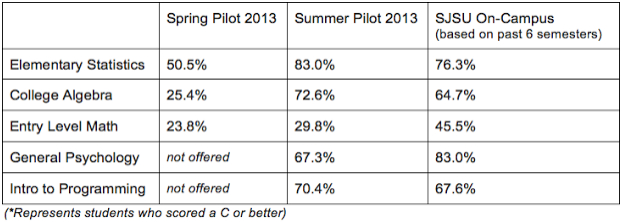Latest Results From Online Classes Not Reflective of Student Learning


The integration of online classes into higher education is developing in California, but private online education provider Udacity is reporting its progress. Its Spring 2013 pilot program had underwhelming results. However, the latest results do not reflect effective learning for college students.
Udacity's entrance to higher education began with a partnership at San Jose State University (SJSU). The course offerings are open to more than just SJSU students, though.
Udacity posted results from the five classes it offered this Summer and compared them to the previous program and the SJSU on-campus average pass rate:
Source: Udacity
However, its progress of better reflecting the on-campus versions classes is limited. Its educational demographic for the Summer program is vastly different from the Spring:
"Among the student body, 53% reported that they already hold a post-secondary degree (5% Associate, 28% Bachelor’s, 16% Master’s, and 4% Doctorate). Only 12% of the students had a high school graduate diploma or equivalent, and 15% were active high school students.""This is very different from the Spring Pilot, in which approximately 50% of the student body were active high school students, and the other 50% were matriculated SJSU students."
The Spring student population is more reflective of college students, those are taking required classes for credit. Udacity itself reported that 33 percent of Summer students were motivated to take these classes because of "love of learning" -- the most frequent reason.
As great as it would be for every college student to take classes simply because they love learning, it's not always the case. CEO of Udacity Sebastian Thrun stated, "In short, pass rates are up and match more closely those in SJSU on-campus classes." But the closely-matched results are coming from a student body that doesn't match those attending college.
Udacity is not claiming it had a breakthrough in online learning, as they acknowledge that this is uncharted territory. Online learning in higher education is far from its full potential. Even lawmakers have acknowledged that, since California Senate pro Tem Darrell Steinberg rescinded a bill -- SB 520 -- to expand online classes at the CSU and UC level.
SJSU philosophy professors have stated firm opposition to the entrance of online classes to the campus. They stated a separate online course program, edX, was "a serious compromise to the quality of education." Though the classes were voluntary, the department said it felt pressure to promote those classes.
Governor Jerry Brown and legislative leaders like Steinberg are supportive of online classes at the college level. It can be cost effective, and it could be a solution to long waitlists and overcrowded classes that are required for graduation. It's a matter of time before online classes are a part of the universities, but further developments need to be made.



